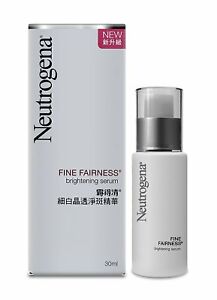Neutrogena
Neutrogena is an American brand of skin care, hair care and cosmetics that is owned by Johnson & Johnson and is headquartered in Los Angeles, California. According to product advertising at their website, Neutrogena products are distributed in more than 70 countries. Neutrogena was founded in 1930 by Emanuel Stolaroff, and was originally a cosmetics company named Natone. It is now part of the US-based Johnson & Johnson conglomerate, which bought the independent company in 1994.[1]
Contents
Neutrogena’s “Fine Fairness”
Beauty brands are facing growing pressure to address the racism built into their products targeted at consumers who live outside the US, particularly those that boast of skin lightening and whitening properties.
Global conglomerates including Johnson & Johnson have begun renaming or removing such products that uphold white skin as desirable. But applying Western expectations onto audiences in Asia, where skin-lightening products are sold, is fraught. Many consumers don’t support the removal of these products, even if the intent is to stop promoting light skin as the beauty ideal. Such standards have led beauty companies in Asia to market products that are insensitive to Black people and dark-skinned consumers[2]
After the attention to the space follows weeks of anti-racism protests in response to the killings of George Floyd, Breonna Taylor and Ahmaud Arbery and the resulting reckoning of the racist practices embedded in many companies. Johnson & Johnson, their marketing strategy to remove racially sensitive branding and products that promote skin lightening, has said it will stop selling Neutrogena’s “Fine Fairness” that are marketed as dark-spot reducers but have been purchased by some consumers to lighten skin tone.[2] The product was not distributed in the United States but were sold in Asia and the Middle East. In Asia, commercials advertising Neutrogena Fine Fairness have described how it allows a consumer to “whiten more thoroughly.”[3]
Concept of Whitening
Whitening is social conditioning wherein people internalize the ideal that “white is right” and “white is most beautiful.” Beauty campaigns replete with grinning white (and fairer-skinned nonwhite) women convey the message that clear, bright, light skin begets a happy and beautiful woman; the messaging in these campaigns can be understood as part of a larger practice of social engineering where strategies are employed to influence attitudes and social practice within wider society.
And the visuals are not simply advertised to white, Western consumers. Nigeria is one of the world’s largest markets for skin lightening products; Cameroonian pop star Dencia created her own “dark spot remover,” Whitenicious, in 2014, whose first run sold out in just 24 hours.
The concept of skin purity has been fraught and painful for a long time because of its roots in white supremacy. Blanqueamiento (or branqueamento in Portuguese), which means “whitening,” was the name of both official and unofficial policy in a number of Latin American countries, including Brazil and Cuba, in the late 19th and early 20th centuries. This state-sponsored policy was a solution to the “Negro problem,” or the large Black/African-descendant populations in many Latin American states resulting from the trans-Atlantic slave trade.[4]
Support to Black Lives Matter
After Black Lives Matter movement, other than stop selling Neutrogena’s “Fine Fairness”, Neutrogena also donated $100K to the NAACP and $100K to Black Lives Matter. “We have a responsibility to use our voice to speak up against systemic racism, to educate ourselves and others, and to challenge the world around us,” the brand wrote on their Instagram.[5]
References
- ↑ Neutrogena. Wikipedia. Retrieved January 29, 2021.
- ↑ 2.0 2.1 Chitrakorn, Kati. Beauty ideals were built on racist stereotypes. What now?. July 8, 2020. voguebusiness.com. Retrieved January 29, 2021.
- ↑ Cramer, Maria. Johnson & Johnson Will Stop Selling Skin-Whitening Lotions. June 19, 2020. nytimes.com. Retrieved January 29, 2021.
- ↑ Samudzi, Zoé. The Encoded Racist Messages of Skin Care Marketing. April 26, 2018. racked.com. Retrieved January 29, 2021.
- ↑ Peters, Alex. An Ongoing List of Beauty Brands Who Have Donated to Fight Systemic Racism. dazeddigital.com. Retrieved January 27, 2021.

